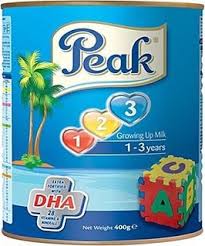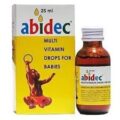West African Milk Company Plc (WAMCO) produces Peak 123 in Nigeria. Many people in Nigeria know that Peak stands for tasty and nutritional dairy. All Peak products, including Peak 123 milk are produced under the highest quality standards. Powdered milk and condensed milk, contain 28 vitamins and minerals, including vitamin B1, B12 and iodine.
Peak provide Nigerians with dairy products that aren’t just tasty but healthy as well. That’s why they are constantly working on the development of new Peak products which meet the needs of many consumers. In addition, they produce all Peak dairy products according to strict quality rules.
Ever since the introduction of Peak brand into the Nigerian market, the brand has continued to grow despite changing market conditions. Peak’s success is attributed to two things: first of all to a singular focus, which is to nourish Nigerians with quality dairy nutrition and convince the consumer that good nutrition is important. And secondly continuously explore and develop ways to stand out in the crowded shelves in stores and to touch the consumers in every stage of their lives. Also See Golden Morn
Is Peak 123 Milk Good For Babies?
Peak 123 milk is a special kind of milk that is essential and supports the growth of toddlers. This powdered milk produced by Peak is one of the most effective milk out there right now. Just like the name says, it is recommended for children from ages 1-3. Peak 123 is a ready-to-drink complete food drink with very good taste.
Peak 123 Milk is enriched with 28 Vitamins & Minerals Extra fortified with Docosahexaenoic acid (DHA) Specially formulated for vital years of maximum growth. Extra fortified with DHA. Support memory function. During pregnancy, women may be advised to take prenatal supplements containing 200mg to 300mg of DHA due to their benefits on brain development. Several studies have found positive associations between DHA supplementation during pregnancy and neurological development in infants.
DHA is an omega-3 fatty acid that is important for brain development and function and is found in breast milk, as well as in some types of fish and seafood. Many studies have suggested that DHA supplementation can improve cognitive and visual development in infants and young children, particularly those born prematurely. However, it’s important to note that the evidence is not conclusive and some studies have shown mixed results.
Bone and Eye Health: One study, published in the American Journal of Clinical Nutrition, found babies of mothers who supplemented with DHA had better early visual acuity than those whose mothers did not supplement. Peak 123 also contains calcium which is essential for building strong bones and teeth in babies. Milk is an excellent source of calcium, and breast milk is naturally rich in this mineral. Calcium is particularly important for babies during the first year of life, as this is when bones are growing and developing at a rapid pace.
Vitamin D another important vitamin for bone health is also present in this milk because it helps the body absorb calcium. Milk is often fortified with vitamin D like Peak 123, are even more nutritious. Breast milk also contains vitamin D, although the exact amount can vary depending on the mother’s diet and exposure to sunlight. Vitamin A is important for healthy vision and immune function is found in Peak 123
Brain Development: Another study published in the American Journal of Clinical Nutrition showed children of mothers who supplemented during pregnancy demonstrated better problem-solving abilities during the first year of their life than control subjects whose mothers did not supplement.
Full-Term Births: DHA supplementation during the later weeks of pregnancy is also linked to a decreased risk of early preterm labor.
In the study, published in the American Journal of Clinical Nutrition, 350 women were given either 600mg of DHA or a placebo daily during the last half of pregnancy. Women taking the DHA had a longer duration of pregnancy and babies with greater birth weights, lengths, and head circumferences than those given a placebo.
In addition, the DHA pregnancies had lower rates of infants born at 34 weeks or earlier and shorter hospital stays for infants born preterm.
Autism and ADHD: Additional research published in the journal Critical Reviews in Food Science and Nutrition in 2019 shows that higher DHA levels at birth are associated with better childhood neurodevelopmental health, while lower DHA levels were linked to higher rates of autism spectrum disorders and attention-deficit/hyperactivity disorder. Zinc is important for healthy growth and development, as well as for a strong immune system is also found in this milk.
Early Childhood
In the first six months of life, DHA is especially important for the development of the nervous system. Breastfeeding mothers are encouraged to continue taking 200 mg to 300 mg of DHA a day, and most infant formulas also contain DHA. This amount must be balanced with the amount of arachidonic acid in the formula as too much DHA might limit the benefits derived from the arachidonic acid which is also essential for healthy development.
Low levels of DHA in early childhood are associated with lower literacy ability, while higher levels are linked to enhanced cognitive development and performance, memory and speed of performing mental tasks, according to a 2014 study published in the journal Nutrients.
Although study results are mixed, some have shown supplementing with DHA may help to ease the symptoms of ADHD. An article published in 2017 reviewed 16 studies looking at omega-3/6 supplementation and found in 13 studies that supplementation demonstrated favorable effects on ADHD symptoms.
Iron is essential for healthy growth and development, as it helps to transport oxygen throughout the body. Breast milk contains a small amount of iron, but the amount may not be enough to meet a baby’s needs after the first few months of life. For this reason, iron-fortified infant milk like Peak 123 is recommended for babies who are not exclusively breastfed.
Peak 123 Milk is enriched with Vitamin B1 (thiamine), vitamin B12 (cobalamin), and iodine which are all important nutrients for babies. Here’s why:
Vitamin B1 (thiamine): Vitamin B1 is important for healthy growth and development, as well as for the proper functioning of the nervous system. It helps the body to convert food into energy, and is important for the metabolism of carbohydrates.
Vitamin B12 (cobalamin): Vitamin B12 is essential for healthy brain development and the formation of red blood cells. It is only found in animal products, so breastfed babies may need a supplement if the mother is vegan or has a vitamin B12 deficiency. Peak 123 Milk is typically fortified with vitamin B12.
Iodine: Iodine is important for healthy thyroid function, which regulates metabolism and growth. It is essential for healthy brain development, particularly during the first few years of life. Iodine is often added to table salt, and is also found in seafood, dairy products, and some fruits and vegetables. Breast milk contains iodine, but the amount can vary depending on the mother’s diet and exposure to iodine.
ALSO READ: Milo: Ingredients, Health Benefits, Side Effects






